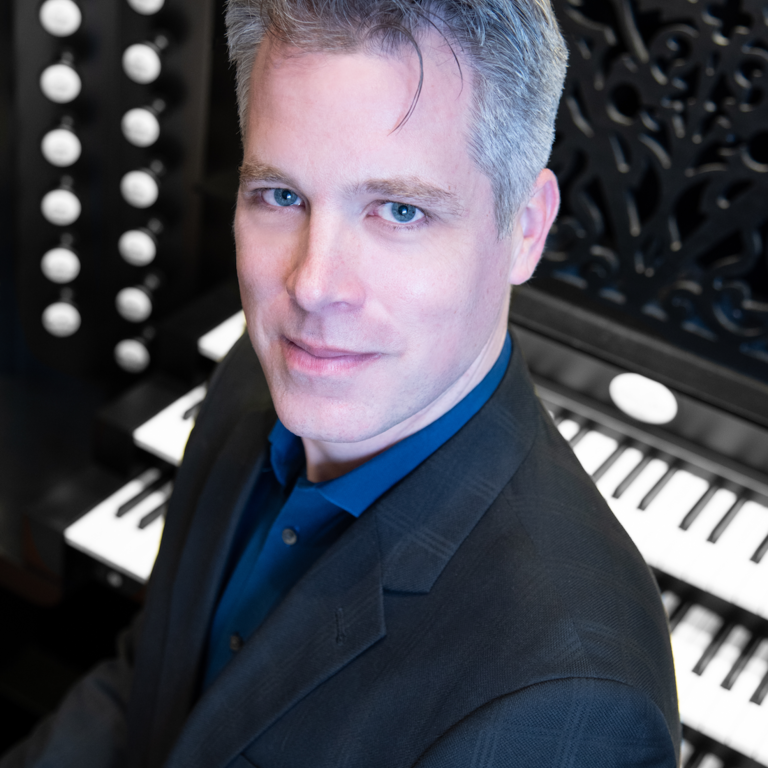Main navigation
Earn your MA in Organ
Learn about pursuing your Master of Arts in Organ at the University of Iowa School of Music.
Specific audition requirements
Application for admission to the degree will be processed when an approved audition has been completed. Completing the application by January 4 will enhance the possibility of financial assistance. All auditions will require video links. Two to four contrasting pieces, including a work by J.S. Bach. Memory not required.
For more information about the MA in Organ or about the audition process, please contact Gregory Hand.
Requirements and program planning
- Introduction to Graduate Study in Music (MUS:5300), 2 semester hours
Students exempt from MUS:5200 through the advisory examination in music theory must complete 6 semester hours from the following:
- Counterpoint Before 1600 (MUS:4200), 3 semester hours
- Counterpoint After 1600 (MUS:4201), 3 semester hours
- Jazz Theory (MUS:4730), 3 semester hours
- Tonal Analysis (MUS:5235), 3 semester hours
- Non-Tonal Analysis (MUS:5236), 3 semester hours
- Analysis of Popular Music (MUS:5237), 3 semester hours
- Special Topics in Theory and Analysis (MUS:5240), 3 semester hours
- History of Ideas in Music (MUS:6210), 3 semester hours
- Theoretical Approaches to Music (MUS:6211), 3 semester hours
- Theory Pedagogy (MUS:6215), 3 semester hours
- Advanced Tonal Theory and Analysis (MUS:6250), 3 semester hours
- Advanced Non-Tonal Theory and Analysis (MUS:6251), 3 semester hours
- Advanced Theory and Analysis of Popular Music (MUS:6252), 3 semester hours
Select from the music history courses in the following list. Only one 4000-level course (taken at the University of Iowa or equivalent transferred in from another institution) may count toward the 6 semester hours required:
- Music and Gender (MUS:4320), 3 semester hours
- Medieval and Renaissance Music (MUS:4325), 3 semester hours
- Baroque Music (MUS:4330), 3 semester hours
- 18th-Century Music (MUS:4335), 3 semester hours
- 19th-Century Music (MUS:4340), 3 semester hours
- 20th-Century Music (MUS:4345), 3 semester hours
- Advanced Jazz History (MUS:4350), 3 semester hours
- American Music (MUS:4355), 3 semester hours
- Jazz Matters (MUS:4360), 3 semester hours
- Studies in Film and Music (MUS:4610), 3 semester hours
- Teaching Music, History, and Culture (MUS:6305), 3 semester hours
- Topics in Musicology (MUS:6310), 3 semester hours
- Historical Approaches to Music (MUS:6312), 3 semester hours
- Topics in Ethnomusicology (MUS:6314), 3 semester hours
- Foundations of Ethnomusicology (MUS:6315), 3 semester hours
- Renaissance Music Notations (MUS:6326), 3 semester hours
- Music Editing (MUS:6375), 3 semester hours
- Major Ensemble (four semesters required), 1 semester hour each
- Organ majors may substitute piano accompanying for major ensemble participation, at their major applied teacher's discretion.
- Major Organ (MUS:6022), 2 semester hours
- Four semesters are required for a total of 8 semester hours.
- At least 6 semester hours of the following:
- Organ Literature Survey (MUS:4450), 2 semesters
- Liturgics (MUS:4452), 2 semester hours
- Service Playing and Improvisation (MUS:4454), 2 semester hours
- History of Organ Building and Design (MUS:5450), 2 semester hours
- Organ Pedagogy (MUS:5452), 2 semester hours
- Hymnology (MUS:5465), 1 to 2 semester hours
- Organ Literature Special Topics (MUS:5475), 2 semester hours
- This course can be repeated.
- MA Recital (MUS:6900), 1 to 2 semester hours
The recital program should reflect a broad background of organ literature. A major portion of the recital is to be performed by memory. The recital may be performed after a satisfactory pre-hearing before the organ faculty no later than one month prior to the scheduled recital date.
The recital committee shall consist of three faculty members (the organ faculty and two additional School of Music faculty members).
The final examination committee shall include the organ faculty, one faculty member from either the theory or music history area, and one more School of Music faculty member.
Create your academic path
You'll find degree overviews, requirements, course lists, academic plans, and more to help you plan your education and explore your possibilities.
Current course list
The MyUI Schedule displays registered courses for a particular session and is available to enrolled students. The list view includes course instructors, time and location, and features to drop courses or change sections.
Add a minor
Any student admitted to a graduate degree program in the School of Music may add a theory pedagogy minor by completing the required courses.
Organ faculty

Gregory Hand

Melanie Sigafoose
Practice and perform
Need to book a music room, request an accompanist, check out audition information, rent a locker, or use a recording studio? Visit the Music Callboard for all scheduling and policy information.